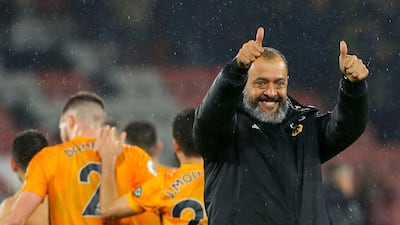Hard though it sometimes seems for Jose Mourinho to let the limelight stray far from his own set of honours and status in club football, he was willing on Monday to list titles he has not won. “Champion of Africa,” he mentioned, and “champion of South America.” He could have gone on to mention champion of China, or holder of the European Championship.
His topic was the disproportionate influence of Portuguese coaches around the world, and how a relatively small nation punches so far above its weight in football management.
Mourinho may be the most celebrated of them, but, even as he was commanding attention with his appointment as Tottenham Hotspur’s new boss, a compatriot was making bigger news: less than six months after taking over Brazil’s Flamengo, Jorge Jesus oversaw a dramatic come-from-behind triumph in the final of the Copa Libertadores.
Then, for an alarming 50 minutes on Tuesday, Mourinho was not even the best Portuguese coach at the Tottenham stadium, Olympiakos’s Pedro Martins having prepared just the right ambush tactics to have his side 2-0 up on Mourinho’s home debut.
On a Champions League evening neither coach would claim advertised their skills as defensive drill-masters, Mourinho eventually came out the winner, 4-2, to put Spurs through the knockout stage of a competition he has lifted twice and to leave Martins scrapping for a place in the Europa League.
In that tournament, several Special Ones are already flying the flag. On Thursday, Ricardo Sa Pinto of Braga; Jorge Fernandes Silas of Lisbon’s Sporting; and Nuno Espirito Santo of Wolverhampton Wanderers, can seal their clubs’ places in the knockout phase. They might yet be joined by Paolo Fonseca and Sergio Conceicao, Portuguese coaches entrusted with the fortunes of illustrious Roma and Porto.
Wolves and Braga meet in Group K knowing a draw would put both through, progress that would further enhance the reputation of Nuno, reportedly a target for Arsenal if they part company with Unai Emery.
That scenario would certainly liven up North London derbies. Nuno used to be a player under Mourinho at Porto, an inspiring time. “He had an impact on me that will stay forever,” Nuno has said. “Mourinho taught us how to win.”
The Mourinho influence has played its part in making Portuguese coaches fashionable – "he changed our methodology", says Martins – and he enjoys hearing the likes of Nuno and Sergio Conceicao, another former Porto player, cite what they learned directly from him.
As for Andre Villas-Boas, currently propelling Marseille upwards in France, 'AVB' acknowledges Mourinho was his most important mentor, though after Villas-Boas left Mourinho’s close-knit group of deputies at Chelsea, the two men fell out.
Villas-Boas then seemed set for managerial greatness when he won the 2011 Europa League, aged just 33, with Porto; less happy spells at Chelsea and Spurs followed. But Marseille are warming to him, having risen briskly over the last month to second in Ligue 1, just ahead of the Portuguese Paulo Sousa’s Bordeaux.
Villas-Boas’s previous job had been at Shanghai SIPG, where he was unable to break Guangzhou Evergrande’s grip on the Chinese Super League.
However, his successor, Vitor Pereira, immediately did, his Chinese league title with Shanghai more evidence of Portuguese coaching’s intrepid spirit and exportable excellence, like the achievements Mourinho referenced: the four African Champions League titles won by the pioneering Algarvian Manuel Jose at Al Ahly and Jesus’s triumph at Flamengo.
Meanwhile, the IFFHS, the game's statisticians and historians, on Wednesday named Fernando Santos, who guided Portugal to their historic Euro 2016 win and the inaugural Uefa Nations League, the best national team coach of 2019.
Portugal’s innovative, academically rigorous coaching courses are behind some of this success, and Olympiakos’s Martins points to another factor: the financial crisis of a decade ago.
“It was an opportunity,” Martins reckons, “because the big clubs opened the doors for Portuguese coaches to show that, without money, we have creativity, and the passion to do our best with whatever we have.”
Reassuring words, perhaps, for Marco Silva, one of the stars of the post-Mourinho generation, but under pressure at Everton, who are assessing his position on a game-by-game basis. If Silva is soon looking for his next job, he can be confident of offers from far and wide. In his line of work, his passport carries kudos.


